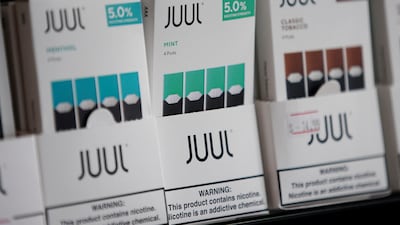Electronic cigarette company Juul and its parent company Altria head to trial on Monday over accusations that they illegally marketed e-cigarettes to youths.
The lawsuit, filed by the state of Minnesota, alleges that Juul and Altria through its illegal practices had also got young adults addicted to tobacco.
“Juul’s e-cigarettes’ youth-focused chemical formulas, flavours, design and marketing efforts, coupled with its deceptive sales practices, have created an addiction crisis,” the state wrote in its complaint.
Minnesota became the first state to sue the company in 2019 when state attorney general Keith Ellison filed a lawsuit hinging on the “public nuisance theory”.
A public nuisance theory allows for companies to be sued if conduct interferes with the rights of the public, such as a health epidemic. It is the same theory that 46 states cited when they sued some of the biggest tobacco companies in the 1990s, resulting in one of the largest settlements in US history.
The lawsuit states that more than one in four young adults in the state currently use e-cigarettes, twice as many as in 2014. Of this number, about 75 per cent had never smoked before and the state says the rise in e-cigarette use among youth is accelerating.
Minnesota accuses Juul of playing a “central role in the epidemic” by using the same techniques that cigarette companies did decades earlier.
The lawsuit states that the e-cigarette maker used colourful images, youth-oriented messaging and paid youth-oriented influencers to pose with product in its targeted marketing campaign.
“Defendants’ unconscionable actions are unfair, deceptive and illegal under Minnesota law. They also constitute a public nuisance that has caused great harm to Minnesota, its residents and especially to its youth,” the lawsuit reads.
Juul and Altria dispute the state's allegations that they played a role in the rapid rise of e-cigarette use among youths.
In a November motion, Juul accused Minnesota of contributing to the rise in e-cigarrete use by minors by not funding prevention efforts from tobacco settlements.
“Defendants contend that in 2018, the State received $166 million in tobacco settlement funds but did not spend any of those funds on tobacco prevention, control or treatment,” the court filing reads.
Juul also said Minnesota was aware of the growing use of youth vaping “well before Juul came on the scene”.
The trial is expected to last three weeks.

